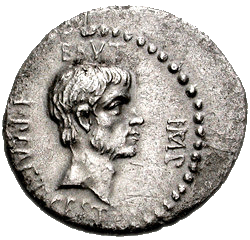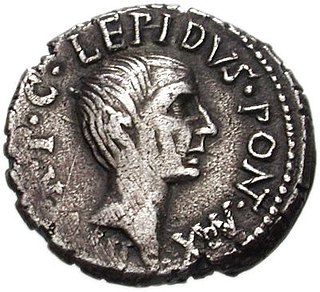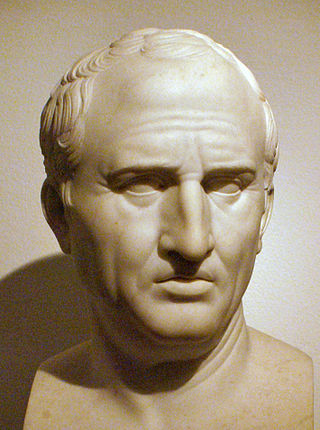Related Research Articles

Marcus Tullius Cicero was a Roman statesman, lawyer, scholar, philosopher, writer and Academic skeptic, who tried to uphold optimate principles during the political crises that led to the establishment of the Roman Empire. His extensive writings include treatises on rhetoric, philosophy and politics. He is considered one of Rome's greatest orators and prose stylists and the innovator of what became known as "Ciceronian rhetoric". Cicero was educated in Rome and in Greece. He came from a wealthy municipal family of the Roman equestrian order, and served as consul in 63 BC.

Marcus Antonius, commonly known in English as Mark Antony, was a Roman politician and general who played a critical role in the transformation of the Roman Republic from a constitutional republic into the autocratic Roman Empire.
Year 43 BC was either a common year starting on Sunday, Monday or Tuesday or a leap year starting on Sunday or Monday of the Julian calendar and a common year starting on Monday of the Proleptic Julian calendar. At the time, it was known as the Year of the Consulship of Pansa and Hirtius. The denomination 43 BC for this year has been used since the early medieval period, when the Anno Domini calendar era became the prevalent method in Europe for naming years.

Year 44 BC was either a common year starting on Sunday, common year starting on Monday, leap year starting on Friday, or leap year starting on Saturday. and a common year starting on Sunday of the Proleptic Julian calendar. At the time, it was known as the Year of the Consulship of Julius Caesar V and Marc Antony. The denomination 44 BC for this year has been used since the early medieval period, when the Anno Domini calendar era became the prevalent method in Europe for naming years.

This article concerns the period 49 BC – 40 BC.

Marcus Junius Brutus was a Roman politician, orator, and the most famous of the assassins of Julius Caesar. After being adopted by a relative, he used the name Quintus Servilius Caepio Brutus, which was retained as his legal name. He is often referred to simply as Brutus.

Marcus Aemilius Lepidus was a Roman general and statesman who formed the Second Triumvirate alongside Octavian and Mark Antony during the final years of the Roman Republic. Lepidus had previously been a close ally of Julius Caesar. He was also the last pontifex maximus before the Roman Empire, and (presumably) the last interrex and magister equitum to hold military command.
The gens Tullia was a family at ancient Rome, with both patrician and plebeian branches. The first of this gens to obtain the consulship was Manius Tullius Longus in 500 BC, but the most illustrious of the family was Marcus Tullius Cicero, the statesman, orator, and scholar of the first century BC. The earliest of the Tullii who appear in history were patrician, but all of the Tullii mentioned in later times were plebeian, and some of them were descended from freedmen. The English form Tully, often found in older works, especially in reference to Cicero, is now considered antiquated.

Quintus Fufius Calenus was a Roman Republican politician and general. When Fufius was plebeian tribune in 61 BC he was an ally of Publius Clodius Pulcher during the Bona Dea affair. During his praetorship in 59 BC he supported Julius Caesar who was then consul. Fufius later served under Caesar at the close of the Gallic Wars and during the civil war that followed. For his services he was made consul in 47 BC. After Caesar's death in 44 BC, he supported Mark Antony against Cicero during the ensuing conflict in the senate. As an ally of Antony governing Cisalpine Gaul, he died of illness in 40 BC on the cusp of intervening in the Perusine War.

Fulvia was an aristocratic Roman woman who lived during the Late Roman Republic. Fulvia's birth into an important political dynasty facilitated her relationships and, later on, marriages to Publius Clodius Pulcher, Gaius Scribonius Curio, and Mark Antony. All of these men would go on to lead increasingly promising political careers as populares, tribunes, and supporters of Julius Caesar.
Decimus Junius Brutus Albinus was a Roman general and politician of the late republican period and one of the leading instigators of Julius Caesar's assassination. He had previously been an important supporter of Caesar in the Gallic Wars and in the civil war against Pompey. Decimus Brutus is often confused with his distant cousin and fellow conspirator, Marcus Junius Brutus.

Lucius Aemilius Paullus was a Roman politician. He was the brother of triumvir Marcus Aemilius Lepidus and son to Marcus Aemilius Lepidus the consul of 78 BC. His mother may have been a daughter of Lucius Appuleius Saturninus.
Marcus Tullius Cicero Minor, or Cicero the Younger, was born in 65 or 64 BC. He was the son of Marcus Tullius Cicero, who as a distinguished orator and consular senator was one of the leading figures of the Roman Republic during the 1st century BC, and his first wife, Terentia. Cicero Minor had an elder sister, Tullia, who was born in 79 BC and died in 45 BC.

The Philippics are a series of 14 speeches composed by Cicero in 44 and 43 BC, condemning Mark Antony. Cicero likened these speeches to those of Demosthenes against Philip II of Macedon; both Demosthenes' and Cicero's speeches became known as Philippics. Cicero's Second Philippic is styled after Demosthenes' On the Crown.

The political career of Marcus Tullius Cicero began in 76 BC with his election to the office of quaestor, and ended in 43 BC, when he was assassinated upon the orders of Mark Antony. Cicero, a Roman statesman, lawyer, political theorist, philosopher, and Roman constitutionalist, reached the height of Roman power, the Consulship, and played a critical role in the transformation of the Roman Republic into the Roman Empire. A contemporary of Julius Caesar, Cicero is widely considered one of Rome's greatest orators and prose stylists.
The gens Cornificia was a plebeian family at Rome. No persons of this name occur until the last century of the Republic; and the first who obtained any of the higher honours of the state was Quintus Cornificius, praetor in 66 BC.
The gens Fufia was a plebeian family at ancient Rome. The gens does not appear to have been of great antiquity, and only appears in history toward the beginning of the first century BC.

Dictator is a historical novel by British author Robert Harris, published in 2015, which concludes his trilogy about the life of the Roman lawyer, politician and orator, Cicero. Dictator follows the first novel Imperium (2006) and the second novel Lustrum (2009). It is both a biography of Cicero and a tapestry of Rome in the time of Pompey, Crassus, Cato, Caesar, Clodius and ultimately Octavian.
The War of Mutina was a civil war between the Roman Senate and Mark Antony in Northern Italy. It was the first civil war after the assassination of Julius Caesar. The main issue of the war were attempts by the Senate to resist Antony's forceful assumption of the strategically important provinces of Transalpine and Cisalpine Gaul from their governors. The Senate, led by Cicero and the consuls, attempted to woo Julius Caesar's heir to fight against Antony. Octavian, however, would pursue his own agenda.
References
- ↑ Tripney, Natasha (8 December 2017). "Imperium Parts I and II". The Stage . Retrieved 22 January 2018.
- ↑ "Imperium West End - Official Website". Archived from the original on 21 August 2018. Retrieved 17 September 2018.
- ↑ "Imperium I: Conspirator". Royal Shakespeare Company. Retrieved 1 March 2022.